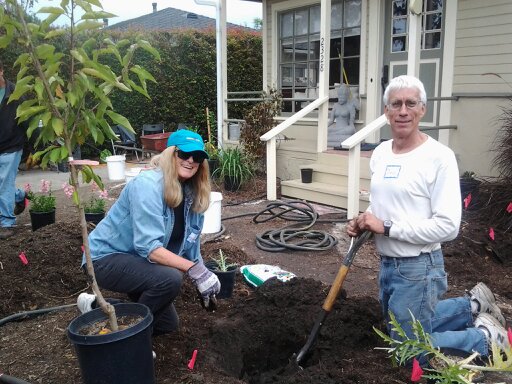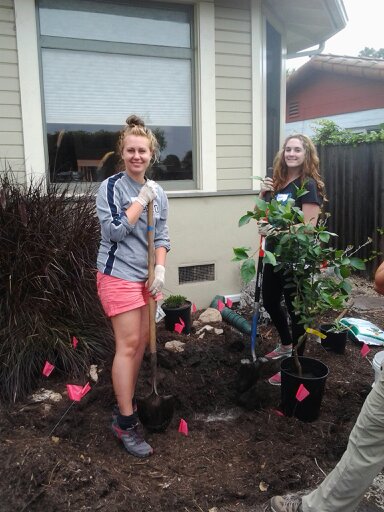When considering buying trees with the intention of dry farming them, make sure that you choose trees that do not demand a lot of water. You can use resources like CA Rare Fruit Tree Growers local members and website http://www.crfg.org/ and The California Backyard Orchard http://homeorchard.ucdavis.edu/The_Big_Picture/Tree_Selection/ to help select appropriate varieties. If you want to be more thorough, consult http://www.water.ca.gov/wateruseefficiency/docs/wucols00.pdf, A Guide to Estimating Irrigation Needs of Landscape Plantings in CA. But remember, this resource does not consider the option of dry farming when making these estimates.
It's also important to pay attention to the tree's root stock and select varieties that are cultivated for our area.
Tree Planting Extravaganza, July 2013:

One helpful technique for successful dry farming of fruit trees is keeping mulch on the ground around the trees. Organic mulch is recommended. Keep the mulch at least 6 inches away from the tree so that the base of the trunk and the root crown are exposed.
When training young fruit trees to be dry farmed, they do need to be watered during the establishment period, the first three years. Yet the way they are watered will help insure that they are successfully dry farmed or not. It's important to hold off on any watering after the rainy season until the trees show signs of slight stress (not extreme stress). This allows their roots to stretch and reach for possible water, and to develop strong and far reaching root systems. These root systems will be one advantage the trained trees will have to succeed in a dry farmed environment. Deep infrequent watering also promotes healthy root systems.
Deciding to stop watering trees that have gotten used to receiving shallow and frequent irrigation will generally not be a recipe for successful dry farming and is not recommended.
Read more about Dry Farming in this article about Conserving Water in the Garden by local landscape designer Joan Bolton.
http://santabarbaragardens.com/wp/articles/conserving-water-making-every-precious-drop-count/
Hügelkultur Garden Beds
A Hügelkultur is a mound constructed from decaying wood debris and similar compostable woody plant materials that is later planted as a raised bed. It is a gardening technique that has been practiced for centuries in Eastern Europe and Germany. A Hugelkultur is a low-maintenance garden that will eventually not require irrigation or fertilization. Hugelkultur beds have naturally good drainage and create incredibly rich, fertile soil that retains moisture.
I once constructed a Hugelkultur bed to increase the growing capacity of a garden space in a rental that only allowed me use of narrow beds surrounding a concrete patio. I extended the planting space by building a Hugelkultur on top of the patio. I was able to grow a Three Sisters garden and other delicious vegetables using this technique.
Hugelkultur is a technique that requires little water to produce a good harvest, and we are entering what has typically been our long dry season. Many people are still mostly sheltering-in-place and can take advantage of time at home to work more on their gardens. This is also a fun project to do with kids.
A hugelkultur bed is a little more work to set up than a standard garden bed but takes less work over time to maintain. It can actually be less work than building a raised bed. The wood rotting under the Hugelkultur bed will act like compost, creating extremely rich soil. For the first few years, the composting process will warm the soil a bit, so you will have a slightly longer growing season.
The rotting wood also acts as a sponge, retaining water and eventually eliminating the need for irrigation. This ability to absorb and retain water means it can be a good strategy even in desert environments. It has been said that Hugelkultur beds improve the flavor of the fruits and vegetables grown on them.
The Permaculture Institute website has detailed instructions about how to make a Hugelkultur bed.
Enjoy experimenting with this unique gardening technique- and enjoy the fruits of your labor!

